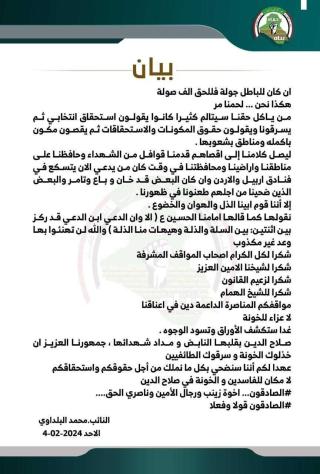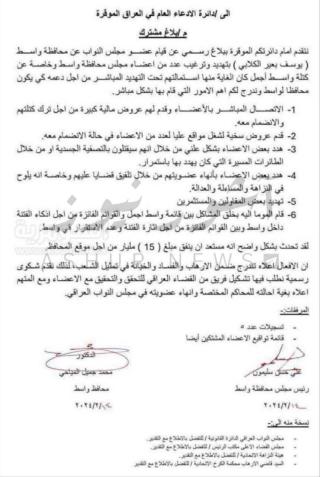
Hadi al-Ameri’s Bad(r) Month

The Badr Organization leader has suffered bruising blows from other Iran-backed militias seeking to exploit the group's internal dysfunction and divisions.
Throughout his political life and during his current tenure as putative head of Iraq's Coordination Framework (CF), Hadi al-Ameri has seen his political fortunes ebb and flow, with observers often writing him off, only for the wily old fox to bounce back. Even so, February has been a particularly challenging month given his largely failed efforts to exert control over the appointment of governors following December’s provincial elections.
Strike One: Salah al-Din Governor
Ameri is famed for being able to deal with anyone, and his ties with numerous Sunni politician-businessmen are well known. Recently, he threw his weight behind Ahmed al-Jubouri (Abu Mazen) for reappointment as governor of Salah al-Din, a move that was ratified by the provincial council with nine out of fifteen votes. This drew strong criticism from the Iran-backed militia Asaib Ahl al-Haq (AAH), whose local parliamentary representative Mohammed al-Baldawi fumed about the appointment:
“Whoever eats our meat will suffer great pain...I swear to God, you will not enjoy it and that is a promise...Thank you for all those who have honorable stances. Thank you, our dear trusty Sheikh [i.e., AAH chief Qais al-Khazali], thank you to the head of the [State of] Law [i.e., Nouri al-Maliki], and thank you to our great sheikh [i.e., Humam Hamoudi of the Islamic Supreme Council of Iraq]. Your supportive stances are the debt we carry. No consolidation to the traitors. The future will show the evidence, and they will be shamed” (Figure 1).
The statement very conspicuously does not praise Ameri or Badr—rather, they are the “traitors” in question. AAH and Maliki went further on February 15, reportedly employing President Abdul Latif Rashid to block Abu Mazen’s ratification on the grounds that he had twice been convicted of corruption (under the Saddam regime and again in 2017; notably, he has also been placed under Global Magnitsky sanctions by the U.S. government for corruption in the service of Iran-backed militias). Abu Mazen may appeal the block, but the case has nonetheless strained relations between Badr and AAH.
Strike Two: Jousting with Shibl al-Zaydi in Wasit
Ameri also failed in his bid to install a Badr proxy as governor of Wasit, creating bad blood with Kataib al-Imam Ali leader Shibl al-Zaydi (who has been sanctioned by the United States for providing material support to Iran's Islamic Revolutionary Guard Corps-Qods Force and Lebanese Hezbollah). Wasit has long been an area of strength for Shibl, so he moved quickly to rebuff Ameri's plan. Speaking on February 9 about the CF's "Nabni" list in the provincial polls, Shibl caustically noted: “Nabni’s share is four provinces, which are Diyala, Diwaniyah, Maysan, and Babil. The one in charge of dividing has fairly divided them: he made breakfast for himself in Diwaniyah, chose Maysan for himself for lunch, and will have dinner in Diyala” (Figure 2).
Shibl was colorfully referring to the manner in which Badr won the governorships of Maysan and Diwaniyah and then tried to go outside this area to seize Wasit, where Shibl’s preferred candidate is Mohammed Jamal al-Mayahi. Other CF members believe that Ameri used two so-called “independents” in parliament to challenge Mayahi’s ratification: acting speaker Muhsin al-Mandalawi and Finance Committee member Yousif al-Kilabi, both of whom lean toward Badr. In response, Mayahi accused Mandalawi of abusing his parliamentary role. Mayahi also has bad history with Kilabi, whom he accused in separate court cases of threatening to assassinate him and use drones against him (Figure 3).
Strike Three: Diyala Governor Is Ejected
In general, observers expect Ameri to effectively manage tensions within Badr and his native Diyala province even when he suffers setbacks at the national level, but this is increasingly not the case. In Diyala, Badr has been slowly losing influence to AAH for nearly a decade, and these fault lines are becoming more open.
Until recently, Ameri had backed Muthanna al-Tamimi as governor of Diyala for years, even threatening other Badr tribal leaders (e.g., Sabah al-Tamimi) when they became rebellious and turned to AAH for support. On November 30, 2023, members of Sabah’s family were attacked in a local ambush that killed eleven of them.
Yet Ameri appeared to miscalculate when he sought to defuse longstanding tensions by removing Muthanna and nominating Mohammed Jassim al-Omairi—son of his pet judge Jassim Mohammed Abboud al-Omairi, the president of the Federal Supreme Court (Figure 4). In doing so, he angered Muthanna as well as the Badr members who have turned to AAH. Worse, his baby-faced candidate failed to win the nomination because he did not meet the minimum age requirement of thirty. Ameri backed down on February 17, improbably claiming that he did not know Mohammed Jassim's age (Figure 5).
A day later, in a land dispute seemingly unrelated to any of the above events, two of Ameri's relatives were assassinated in Rashdiyah on the road to Diyala in northern Baghdad, including his brother-in-law Sabri al-Ameri. Although the timing was coincidental, further discord and security breaches within his tribal circles could give the impression that his leadership and protection are worth less than they used to be. AAH has been strongly challenging Ameri for leadership of the CF and has arguably outstripped him on the national stage. Now the group appears to be coming for him and Badr in their home base of Diyala as well.








